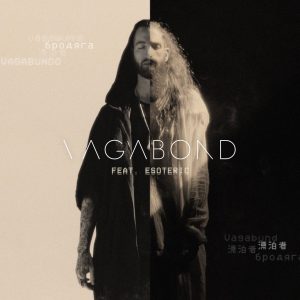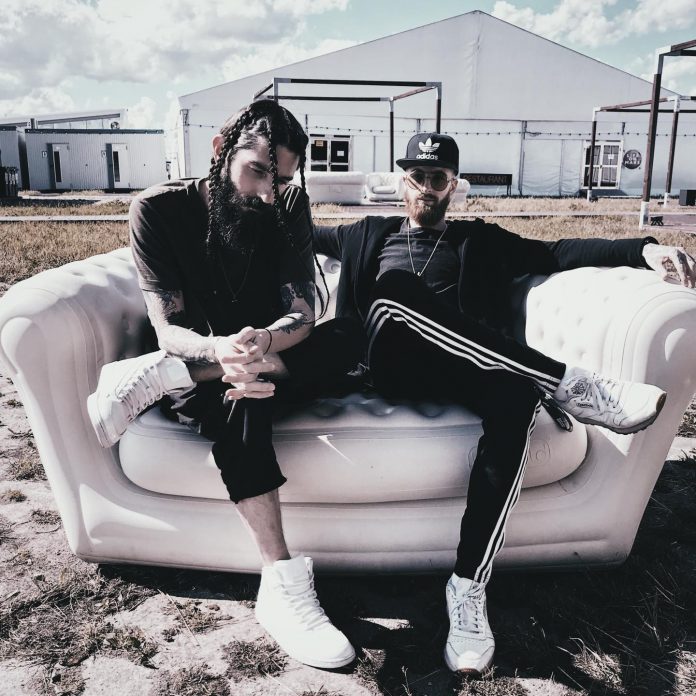Matthew Brue didn’t realize he wanted to be a musician.
Sure, he played piano and sang in choirs as a kid.
But it took a harrowing experience to shed light on his fateful vocation.
“It was going into rehab and utilizing songwriting as a way to get how I was feeling out that culminated into everyone being like ‘You’re really good at what you’re doing, you should look into that,” says Brue. “At the time, my focus was I don’t know if I’m going to survive the next three years. I need to get my shit together before I even consider that. But realizing and recognizing how healing it was to write songs is really what helped me go ‘As of right now, I need to do this because I want to survive. This is helping me with my addictions and I’m going to keep doing it.’”
Brue believes the message Missio, the duo he constitutes with producer and instrumentalist David Butler, conveys carries over to their fan base.
“There are people who feel that same way and they go MISSIO’s songs are speaking to me and are helping me survive,” says Brue. “I’m honored to call myself a musician now, looking at it seven years later.”
Missio, which is Latin for “mission,” sports an alternative/electronic sound with beat-driven hip-hop undertones. Atmospheric and expressive, this electro-alternative act is keen on a spirit of experimentation. On behalf of StripJoints.com, ED Magazine spoke with MISSIO about the duo’s musical evolution, European crowds and their single “Vagabond.”
ED: How did you guys (David & Matt) meet?
DAVE: We met, I don’t know how many years ago, it was a while back. We were both in different bands at the time. I was really producing records as an engineer and a mutual friend of ours who was producing his band brought me in as a co-producer and that was when we first met and worked on songs together and established a friendship which would eventually lead to us experimenting with some of the solo stuff he was writing, which would eventually turn into MISSIO.
MATT: It was born out of a friendship under a banner of just doing whatever the fuck we wanted to do, no real commercial bull in mind, which is how the best ideas start in my experience. What I love about our working relationship is that we cover a lot of ground between the two of us. Typically, a lot of times his strengths are my weaknesses and vice versa, so we’re able to come together and create—whether it’s for the work side or music side—covering all grounds is a necessity for being an artist in 2020, with how many things you have to do and know now with social media and the internet. It’s been a great partnership.

ED: You guys are from Austin, so I’m curious how big a deal it was/how reaffirming it was first playing at SXSW?
DAVE: It’s actually a funny story, it’s not some great heroic story. We were working on some songs in the background—we were both in different bands. My band at the time had booked the SXSW gig and then we broke up. Between us booking and playing the show, we broke up. Just out of luck, a song that Matthew and I had just produced had started to do well on Hype Machine, a huge deal back in the day. There became an opportunity to do a switcharoo on SXSW and we back doored our way into a legit first performance. But it’s a nice sound bite to get to say ‘Hey, we debuted at SXSW.’
MATT: I pulled two of my ribs out carrying my keyboard around downtown. It’s a crazy environment, but it’s an Austin staple. I think the bigger moment for us was being able to play ACL, Austin City Limits, a big old festival here Austin is known for. To know what a big deal that is and then to finally get on that stage, it was surreal. It’s how we made a lot of our fans here in Austin.
ED: What part of your musical makeup do you look at and say ‘we’ve definitely evolved in that respect’?
DAVE: I think we’ve evolved, specifically, sonically in that way because the early stuff—I’m a huge fan of rules and boundaries. We had these rules and boundaries of our process that, to us make sense. Part of our boundary system, was we didn’t have high hat or symbols on the first record, there’s no guitar, there’s really no base—it’s all alternative production to a very electronic sound. To me, electronic music sometimes feels very sterile, like you’re wearing a lab coat when you’re making it. We went through extreme detail, we didn’t perform to a clique. We’ve built in human-ness into the electronic stuff. We’re experimenting on this new record with acoustic guitar, more live drums, because we understand what makes a MISSIO song and what helps get our message across.
MATT: I think we know who we are more now. There’s always going to be a part of us that’s multi-genre and experimental, thinking outside the box. But, we’re coming out our third record this year, and I think we’ve finally locked in enough to know this is what we do as songwriters and producers—we touch into the hip-hop world a little bit, we touch into the alternative world a little bit, but we also touch on the cinematic world, which I think brings that haunting beauty to what we do. Between the three of those things, the culmination creates this MISSIO sound and tone. And also, what David brings to the table from an engineering perspective is unique because he approaches tones and how we get those tones a lot differently than pulling in a lot of samples and calling it a day. It’s like an indie baby meets an electronic baby, that is what MISSIO is. The combining of the two is what creates the tone.
ED: Have you turned to music even more these past few months with the COVID pandemic as a means of escape, stress/boredom relief, etc.?
DAVE: We would have had different answers for this question at a bunch of different times. But at this point in time, the biggest impact it’s had in terms of my musical philosophy, it forced us to re-evaluate. We had to address an intense business question, which was to delay the record or not. We had to get to what is our motivation as artists—do we want to be as strategic as possible, as businessmen and wait for the right time, take advantage of touring, etc. What drove our decision ultimately, our only purpose as artists is to transfer the feelings and energy we’re collecting. This record feels so relevant to what is happening in our lives and what is happening with the pandemic, we felt it was our responsibility to go with it.
ED: Matthew, you mentioned being inspired after your European shows—what was your favorite European city to perform in?
MATT: The European crowds bring an energy that is so different than what you find in the states. Part of me thinks it’s because here in the States, it’s so easy to access shows (outside of 2020). There, it can be a bit more difficult. When they get to see a show, or a band, they’ve been waiting for, they lose their shit. One of my favorite shows was in Zurich, it was a hundred-person club, almost like a coffee shop. They took this couch off the stage and they had these little speakers, but because we were dead center with those fans on this small stage, it was the sweatiest, most crazy fucking night we’ve had. It was the energy. They couldn’t have given two fucks if we messed up every song. They were there to have a good time. You can’t beat those moments.
DAVE: It was Rock for the People, Czech Republic. No disrespect to the American crowds, but the tempo they have with the clapping is not always on point. Also, this was one of the heavier festivals over there. That crowd performed the clap to “Bottom of the Deep Blue Sea” in lockstep. I was having a hard time focusing on playing because it was the best clap.

ED: What’s the most awestruck you’ve been meeting a fellow musician? Why?
DAVE: We didn’t meet, per se, but in the early days of us getting a record deal, we were in LA, there was this fancy sushi, steakhouse—SOHO House Malibu. We’re rolling in there trying to play it cool and first thing that happens, Sting walks by. And then we sit down, and we’re right next to Matt Bellamy from Muse.
MATT: Eddie Vedder’s sister and niece are giant MISSIO fans and I’m taking this photo at the end of the day. I take the picture and everyone’s like ‘Bro, did you see what happened?’ Sure enough, there’s Eddie Vedder behind us, he photobombed the photo.
ED: StripJoints services DJs at gentlemen’s clubs nationwide, so why would “Vagabond” be a good choice to play at a gentlemen’s club?
DAVE: To use cliché references, this particular song takes me to Beastie Boys meets Nine Inch Nails. In the rock genre, or alternative genre, we’re one of the first of many bands that are going to explore this mashup.
MATT: It’s a banger. We were playing it live for the first time trying to learn some of our parts, it crushes man. And when we get Esoteric from Czarface, the low-end on that track is so unique because it’s talking about a band meeting hip-hop or a band meeting electronic music. When you hear it, you’re in. From the second the horns come in, it’s party time.































